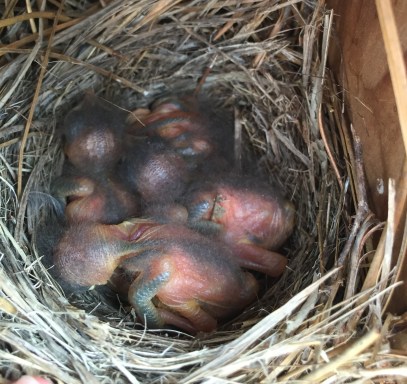Spring is the season of new life. It’s around this time each year that Georgia DNR starts receiving phone calls or Facebook messages from concerned citizens that have found “orphaned wildlife” and want to help. While this gesture is appreciated, it’s often unnecessary.
Most young wildlife has not been abandoned.
If you can’t see a parent nearby, it doesn’t mean the babies have been abandoned. Many times, mom or dad is watching. Does will often leave fawns bedded down alone for several hours while they search for food. The same goes for mother rabbits. They will only return to the young several times a day to draw less attention to the areas and to keep predators from finding them.
Wildlife is tougher than we think.

Wildlife has adapted to survive in the harshest environments and young wildlife is no exception. They do not need our help. Baby birds occasionally fledge too early and spend the next few days on the ground. Adult birds will listen and find the young on the ground and continue to feed them until they fledge successfully. If the bird has not yet grown feathers, it’s best to place them in a tree or shrub near where you found them out of direct sunlight and away from pets and kids. The parents will find them and still continue to feed them.
Important fact: It’s an urban myth that if you touch a baby bird the parents will abandon it.
Recently hatched Eastern bluebird nestlings.
“Rescuing” can do more harm than good.
Continuing to check on young that has been left alone may actually keep the parents from coming back right away. This means that the babies may not be receiving the care they need from their parents. Removing the young from outside also separates the young from its parents. Leaving the animal where you found it will give it the best chance of survival. We often receive calls of baby squirrels that have fallen from their nest. Please leave them be. A parent will come down to get the young and take them back to the nest.
“Taking wildlife out of their environment and into your home often takes away that animal’s ability to then survive in the wild, where they belong,” explains Kaitlin Goode, program manager of the Georgia WRD Urban Wildlife Program.

Young Eastern cottontail rabbit.
They’re not pets.
Wildlife is wild. These animals are not domesticated or tame and will not behave like your pet dog or cat. You should never attempt to feed or handle wild animals. Wild animals also have specialized diets that cannot be easily copied in a human environment.

Young eastern box turtle.
It’s illegal to keep wildlife.
Never take wildlife into your home to try and nurture them. Georgia law prohibits the possession of most wildlife without a permit. If you encounter a seriously injured animal or an animal that clearly has been orphaned, please contact a local, licensed wildlife rehabilitator.

Fawn bedded down waiting for the doe to return.
It isn’t safe for humans or the animal.
Handling wildlife can cause injury to you, the animal, or both. Only a licensed wildlife rehabilitator should handle and rehab wildlife. The animal may look healthy, but wildlife can transmit life-threatening diseases such as rabies and can carry parasites such as roundworms, lice, fleas and ticks.
Want an email when Georgia DNR posts a new blog about wildlife or fishing reports? Be sure to subsribe! If using a phone or tablet, click the follow button at the bottom of your screen. If using a desktop, click the subscribe button on the right side of the page. Then, check your email and “Confirm Your Subscription.”


Homesteading Artist
Thanks for all those reminders Georgia Wildlife! Last year my husband and I were concerned about a baby cardinal we saw flopping about in our backyard. Should not have worried. Soon saw that both parents were at the edge of nearby woods coaxing him toward them. It took him a couple of hours but he made it!
Bill Baab
Can’t print it. Why not? Bill Baab, The Augusta Chronicle
Deb
My back yard is a foraging area for more than seventy species of birds, a few rare salamanders and turtles. A large female alligator turtle used to lay her eggs in or near my back yard u til my neighbors put a fence up blocking her route. Now the nesting grounds is home to a multitude of domesticated farm animals. From time to time a young alligator turtle finds its way into the storm drain beside my house. I examine the tiny creatures and remove any attached leeches, photograph them and return them to where I found them. My reward is that the alligator turtles eat copperhead and water moccasin snakes that live in the storm drain.
Mike Gephart
Great read thanks for posting reading from Oregon . In the industry with allied pest and wildlife
http://Www.alliedpestandwildlife.com